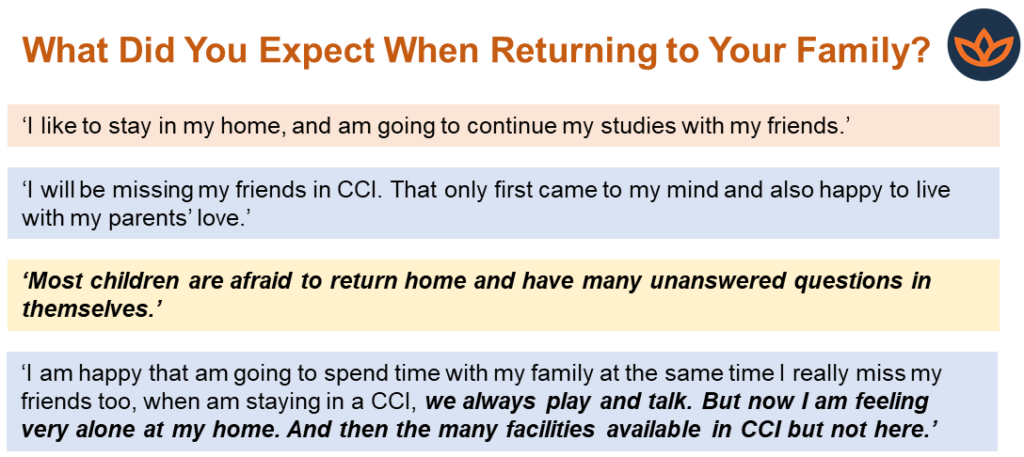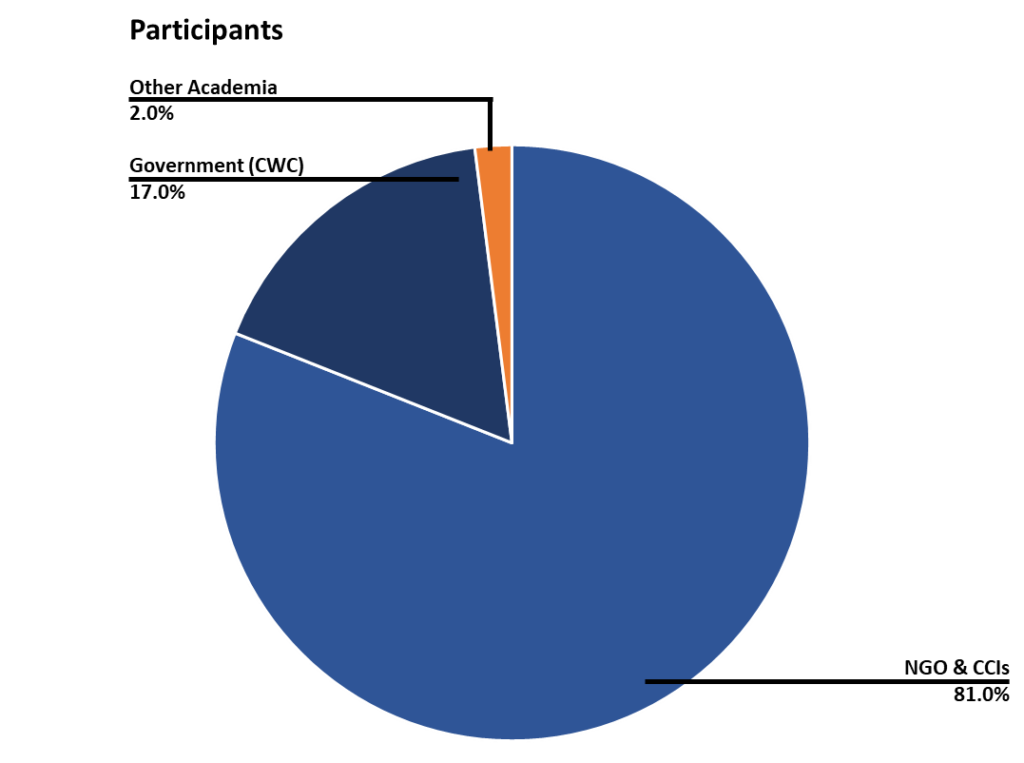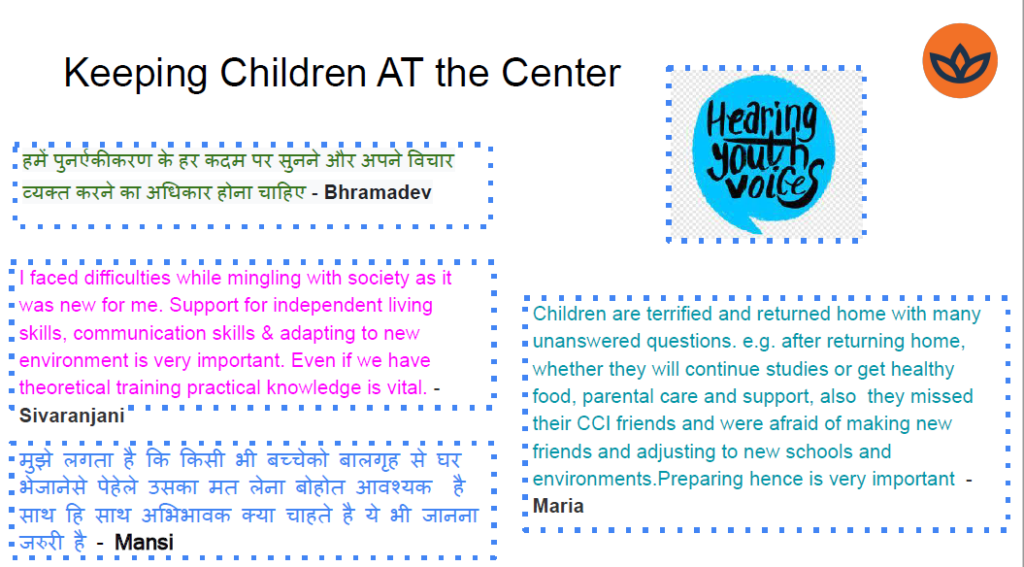
The success of our very first webinar on Safe and Permanent Child Reintegration, held in December 2020, paved the way to starting a discourse on the emerging trends of convergence, the existing process of child reintegration, and plans for bridging gaps in ensuring child rights and child protection in India.
Understanding the rich scope of learning, this year Miracle Foundation India has created a series of webinar workshops. These workshops strive to empower professionals, organisations and government officials working for children’s rights and families to gain in depth knowledge and develop invaluable skills in practical case management processes, focusing on tested approaches and tools, led by Miracle Foundation experts with real-world, on the ground experience. Also, as children are the primary stakeholders in a safe and permanent reintegration process, the workshops highlight their thoughts, suggestions, and opinions through the active participation of children in these workshops. Currently, we have successfully completed three of the workshops from the series.
The first workshop in the series focused on ‘Effective Assessment for Safe and Permanent Reintegration’ which aimed to understand the vitals for an effective child and family assessment, including the need for assessment, key skills for assessors, and effective usage of tools for assessments for recommendations on placement decisions. The workshop also highlighted the ‘youth voice’ through the active participation of Miracle’s Youth Ambassador, Maria, who shared her experience in care and presented the findings of a short survey which she conducted with 10 children who were reintegrated into their families. Some key quotes from children when asked about their expectations upon their return to the family included:
The children emphasised the importance of active participation of children throughout the assessment process not just for mere consultation but valuing their opinions regarding reintegration throughout the process and most importantly investing more time in child and family preparedness to know what to expect. The workshop attended by 186 child care professionals from government and non-government organisations that catered to about 3675 children, was conducted in two languages: English and Hindi.
The workshop also provided an opportunity for a practical case discussion with Q & A with boots on the ground who shared some best practises, struggles and way forward plans while discussing how they were able to effectively utilise the assessment tool for placement decisions and devise intervention plans for the children and families.
The workshop addressed some pertinent questions from participants, focusing on:
- How to build a trusting relationship with children who are unable to open up due to past trauma? – special focus on children in CCI who have been survivors of abuse or neglect.
- How to restart work with children and families in the case when a child returns back to the CCI after a failed family placement?
- How to measure the well-being of children and families post reintegration in the context of remote follow-ups due to the COVID 19 situation?
The speakers shared some key insights on utilising soft skills such as building trusting relations, questioning skills and listening & observation skills which were vital during the assessment process. They shared experiences with the application of assessment tools, especially The Thrive ScaleTM - developed by Miracle Foundation India. This tool helps to assess the individual child and family’s progress in five domains of wellbeing: family and social relationships, living conditions, household economy, education, health and mental health. The speakers highlighted the importance of the Expedite case management process as a response to the immediate return of children to their families due to COVID-19.
The second workshop, titled ‘Wrapping Support Around the Family’ underlined the need to identify the drivers of family separation while addressing them through effective community support services. The experiential sharing on practical approaches to implementing the Family Strengthening Project at Community by our community initiative partner, Deepak Foundation, focused on:
- How to initiate work with a community starting from identification
- Some key on-ground tools that were most effective for ensuring community engagement The importance of a participatory approach since the beginning of the project
Most importantly, the workshop amplified the Youth Voice, where child representatives from Bal-panchayats shared the various on-ground initiatives in their regions focusing on key child protection issues in the community. A Few of these included: promoting children’s right to be ‘heard’ and safety of children in communities; prevention of early marriages and school-dropouts, etc.
This workshop was also conducted in 2 languages – English & Marathi to maximise participation. In total 128 participants (from government , NGOs and academia) attended. They in turn work with over 3000 children and families.
Some participants also drew attention to key struggles/concerns from their experiences that had slowed down the activation of the community-led initiative model in their regions, these include:
Child Protection committees (CPCs) are only on paper and not activated on the ground. The Village Child Protection Committees are formed, but are not familiar with ICPS provisions There is a lack of accountability of WCD when CPCs are not formed or are dysfunctional Many times the families are connected to the Social Protection Schemes. However it takes a lot of time for the schemes to get activated and families to actually receive the benefits.
The third workshop titled ‘New Beginnings – Letting go of the Past and Embracing the Possibilities of Family Reintegration’, focused on the critical element of planning for the transition process. This workshop was divided into 2 parts:
- The first part focused on understanding the transition process from institution to family
- The second part highlighted the importance of family preparation for sustainable placement
The workshop helped to answer the key question which had been raised by many participants in previous workshops – ‘how can we build upon the strengths and skills of the child and family members to allow for successful reunification/placement of the child?’ The workshop focused on adopting a Strength-based-approach in the transition process. It also addressed the fact that assessment should not merely be seen as a tool to evaluate the family’s current situation, rather essentially as a key step in helping in understanding their needs, their relationships with each other, family dynamics, their values and help in setting goals towards a smooth transition. The workshop, which was conducted by Miracle’s mental health consultant,- a trained clinical psychologist and expert from the TISS i-call program, aimed at strengthening the abilities of the participants to work on ‘soft skills’ like building family resilience, and working on strengthening familial bonds. The workshop addressed the impact of unplanned transitions on children & families and provided some key tips, tools and techniques to ensure a smooth transition and sustainable placement.
The workshop also captured children’s voices through the powerful testimony of a reintegrated youth, Sanjana, who shared her journey of transition from CCI to family care. Other children also shared their views on the importance of preparedness in the transition process (quotes mentioned below):
The workshop was also able to successfully address questions raised by the participants regarding:
- What needs to be done if a child protection concern arises during the transition process?
- How to address issues of families’ lack of preparedness when the authorities press for reintegration?
The workshop summed up with a key message that the smooth transition of children into families is not an overnight process, and should be seen as a collective responsibility, and not an extravagance. All stakeholders including government, community, nonprofits play an equal and important role towards its success.The next and final workshop in this series will focus on the importance of post reintegration support. This workshop will conclude the series and will be held regionally (in-person/remote – depending on COVID situation) in Tamil Nadu and Tripura.




